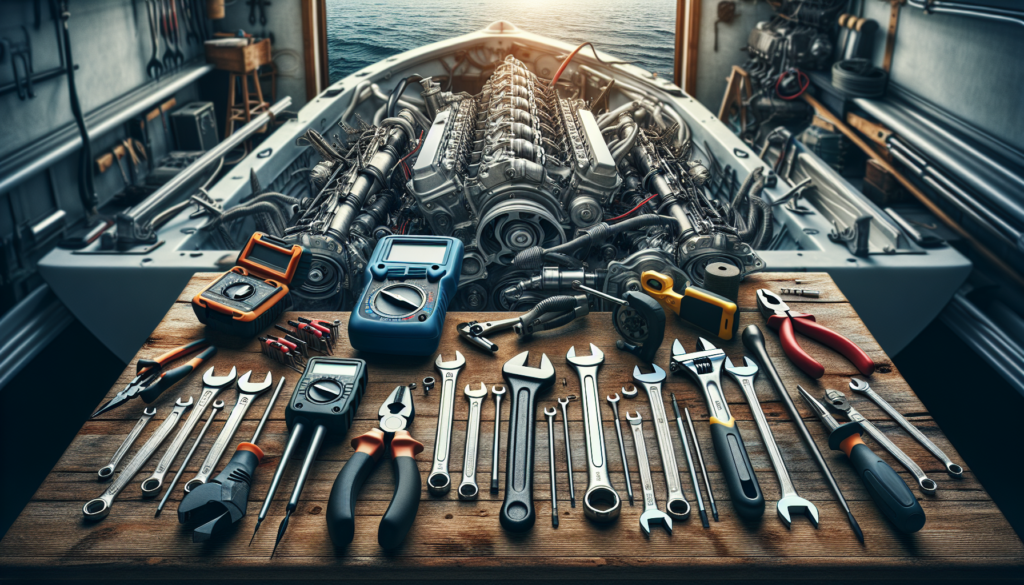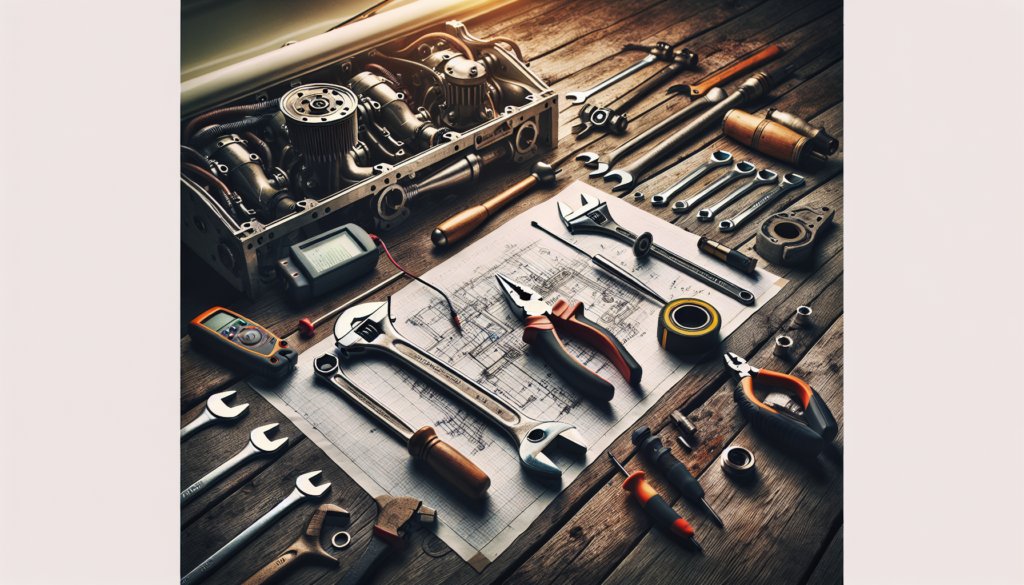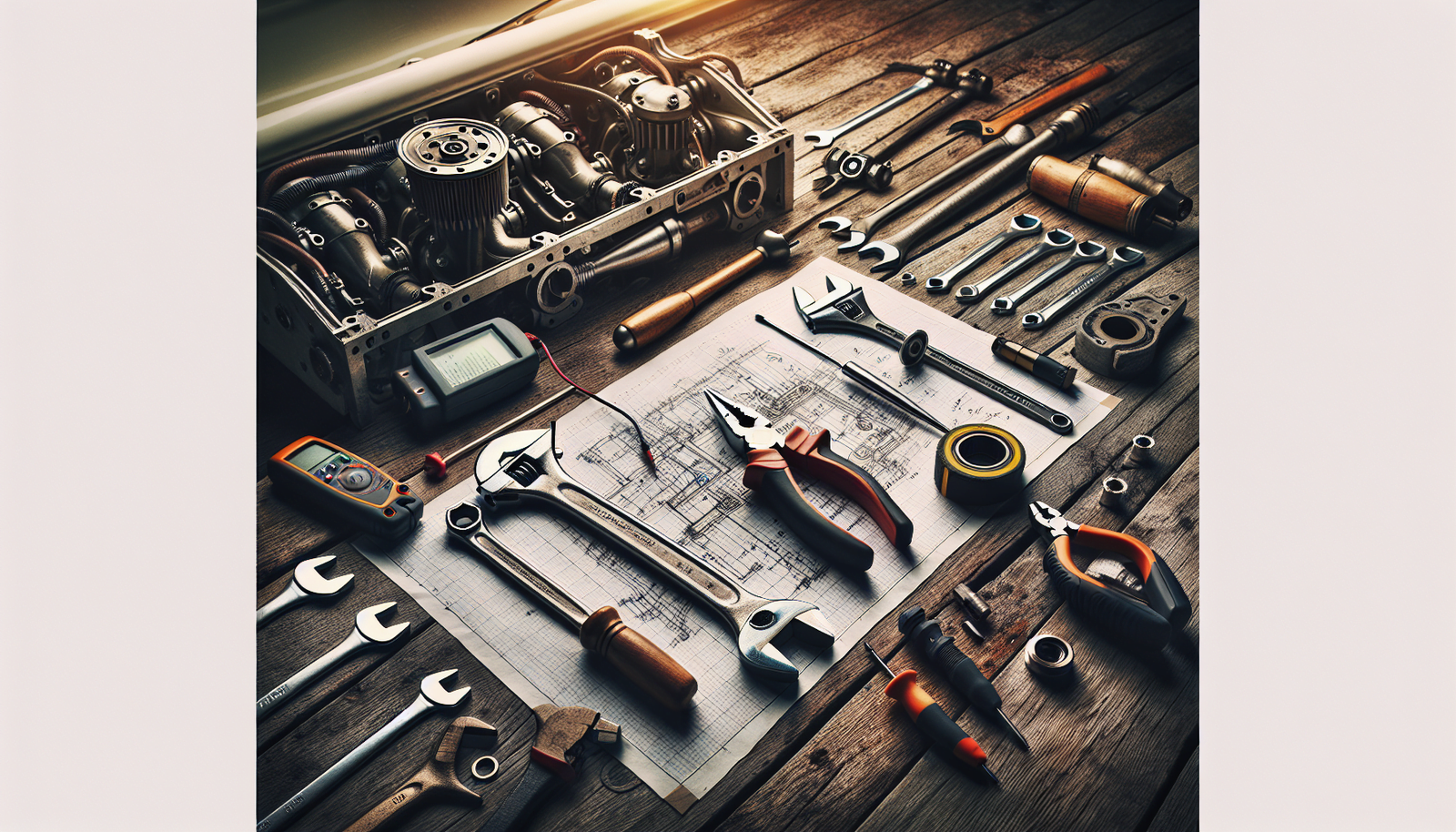If you’re a boat owner who prefers getting their hands dirty instead of taking their boat to the mechanic, then knowing the best tools for DIY boat engine maintenance is crucial. This guide will arm you with the knowledge of the most suitable, effective, and reliable tools that will make your DIY routine easier and more efficient, ultimately saving you both time and money. You’ll learn about everything from basic wrenches and pliers to more specialized tools like a lower unit gearcase filler and propeller wrench. Get ready to equip yourself with the skills and tools necessary to keep your boat engine reliable and efficient all year round.

Understanding the Importance of Boat Engine Maintenance
In the realm of boating, one of the most critical tasks you have as an owner is boat engine maintenance. Regardless of the type or size of your boat, the engine plays a vital role in keeping your marine adventures going.
Knowing the basics of boat engines
The first step to effective boat engine maintenance is understanding the essentials on how boat engines operate. There are two main types of engines you’ll see in boats: inboard and outboard engines. The mechanics of these two engine types might differ slightly, but the principles applied for their upkeep remain largely the same.
Common problems affecting boat engines
Various issues can affect boat engines, and these can hamper its optimum performance or even cause catastrophic damage. Common problems include overheating due to a damaged impeller, oil-related issues such as leaks or incorrect oil levels, and problems with the propellers like having dented blades.
Preventive measures for boat engine problems
The best way to avoid these common issues is through preventative maintenance. This includes things like regular oil changes, routinely checking and cleaning the propellers, and ensuring the cooling system is functioning correctly. When correctly taken care of, boat engine problems can be significantly lessened, leading to a better and safer boating experience.
Preparation for DIY Boat Engine Maintenance
Before you get started with DIY boat engine maintenance, it’s crucial to prepare yourself adequately to ensure the efficiency and effectiveness of your work.
Understanding the boat’s manual
Your boat’s manual is your first point of reference. It would have all specific maintenance guidelines particular to your boat’s engine model. Reading and understanding the manual will equip you with knowledge on the various components of the engine, their functions, and how to properly care for them.
Establishing a maintenance schedule
Creating a maintenance schedule is your next step. Regular maintenance tasks that should be included in the schedule are oil changes, engine check-ups, and parts replacement as advised in the manual. Scheduling these tasks ensures they are not overlooked and helps to prolong the lifespan of your boat’s engine.
Importance of regular inspections
Routine inspections are important in identifying potential issues early on. By routinely checking your boat engine’s various components, you can spot minor problems before they escalate into more damaging and costly repairs.
Essential Tools for General Boat Engine Maintenance
Just as you need the right tools for any job, Maintaining your boat engine requires certain essential tools to complete general tasks.
Toolbox necessities and their functions
A basic tool box for essential boat engine maintenance should include an array of screwdrivers, wrenches, pliers, and a socket set. A high-quality flashlight is a must-have as you will often work in poorly lit areas. Zip ties, electrical tape, and duct tape are other essentials which are handy for quick fixes.
Specialized tools for boat engines
In addition to the basic tools, you may also need specialized tools for certain tasks. These can include a penetrating oil spray for removing rust and corrosion or a spark plug socket for spark plug maintenance.
Getting familiar with the use of each tool
Knowing each tool’s purpose is as important as having the tool itself. Some tools might even be multi-functional, adding versatility to your toolbox. Familiarize yourself with each tool, understand how it functions and when to use it during maintenance procedures.
Advanced Tools for Complex Engine Maintenance
For more complex engine maintenance tasks, more advanced tools are often required.
Diagnostic tools for engine condition
Engine diagnostic tools help in identifying issues with your boat engine. Tools such as compression testers and multimeters are handy diagnostic tools that help you to understand the condition of your engine and detect any problems.
Tools for electrical systems
Boat engines have complex electrical systems. Voltmeters and circuit testers are two of the essential tools to maintain the electrical integrity of your engine, ensuring all electrical connections are performing properly.
Special repair tools for boat engines
Specialized repair tools such as piston ring compressors or bearing drivers might also be needed for more complex repair tasks. While these tools aren’t typically needed for general maintenance, they can be indispensable when undertaking significant engine repairs.

Materials Needed for DIY Boat Engine Maintenance
Apart from tools, several materials are necessary for the successful DIY maintenance of a boat engine.
Essential cleaning agents and their uses
Cleaning agents are indispensable in engine maintenance. Degreasers, for instance, help remove oil and grease buildup on engine parts. Anti-rust sprays prevent rusting of metal parts, and lubricating oils keep mechanical parts running smoothly.
Maintenance fluids and their importance
Other maintenance fluids such as engine oil, coolant, and fuel additives play a vital role in keeping your engine in good shape. They ensure the optimal functioning of your engine and help prevent common problems like overheating and clogging.
Proper disposal of used materials
When performing maintenance, it is crucial to remember the importance of proper disposal of used materials. This includes used oil, spent fluids, and replaced engine parts. Proper disposal not only adheres to environmental regulations but also keeps your workspace clean and safe.
Safety Gear for DIY Boat Engine Maintenance
When performing maintenance tasks, safety is paramount.
Importance of personal protective equipment
Maintaining your boat engine involves handling various chemicals and machinery. Therefore, wearing appropriate personal protective equipment (PPE) is essential. PPE can protect you from potential injuries and harmful substances.
Necessary safety gear and their uses
Basic safety gear includes safety glasses for eye protection, gloves for safeguarding your hands, and sturdy footwear to protect your feet. A dust mask can protect you from inhaling harmful fumes or dust.
Storage and care for safety gear
Just as with your maintenance tools, your safety gear also requires appropriate care. After use, clean them thoroughly, check for any damage, and store them in a dry location.
Maintaining Your Maintenance Tools
Proper care and maintenance of your tools ensures they remain in good condition and extend their lifespan.
Cleaning and preserving your tools
After each use, your tools should be cleaned from any grime, grease, or rust. Once cleaned, it is good practice to lubricate them before storage to prevent rusting and to keep them in good working condition.
Regular inspection of tools for damage
Apart from cleaning, frequently inspect your tools for any signs of damage or wear. Broken or faulty tools can not only lead to inefficient work but also pose safety risks.
Understanding when to replace tools
Knowing when to replace your tools is a key aspect of tool maintenance. While some tools may last you a lifetime, others may need frequent replacements. Paying attention to the condition and performance of your tools will guide you on when a replacement is due.
Getting Training for DIY Boat Engine Maintenance
DIY boat engine maintenance requires some degree of expertise. While learning from guides and manuals can be helpful, getting some formal training can be beneficial.
Local organizations and programs for training
Many local organizations and boating clubs provide practical training on boat engine maintenance. These not only cover the theoretical aspects but also provide hands-on experience.
Online resources for self-learning
If physical training programs aren’t accessible, countless online resources cover boat engine maintenance. Online tutorials and instructional videos can be great learning tools.
The value of hands-on experience
Nothing beats practical experience. After getting training, frequently practicing what you’ve learned is essential. The more you practice, the more comfortable you’ll get with doing maintenance tasks.
When to Call a Professional for Boat Engine Maintenance
While DIY maintenance is rewarding and cost-saving, there are situations where it’s best to call a professional.
Understanding limits of DIY maintenance
You must know your limits when it comes to DIY tasks. If a problem seems too complex, it’s better to call a professional instead of risking further damage.
Identifying complex engine issues
There are tell-tale signs when professional help might be needed. These can include persistent engine problems despite your maintenance efforts or when your engine needs a major overhaul.
Finding a reliable boat engine mechanic
Having a reliable mechanic is crucial. They can provide expert advice and service for those times when DIY just won’t cut it. A great mechanic can not only fix your engine but can provide tips for future maintenance.
Cost-Benefit Analysis of DIY Boat Engine Maintenance
Finally, it’s essential to weigh the costs and benefits of DIY boat engine maintenance.
Financial aspects of DIY boat engine maintenance
DIY maintenance can save you a substantial amount of money over time. The investment in tools and materials is often less than the cost of hiring professionals for regular maintenance.
Time investment for DIY maintenance
On the other hand, DIY maintenance requires a considerable time investment. You need to learn, prepare, practice, and perform the tasks. If you enjoy the process, this might not be a drawback, but it’s worth considering.
Comparing DIY maintenance to professional service
Comparing DIY and professional maintenance involves measuring these costs against each other, both in monetary terms and time investment. DIY can be rewarding and save money, but professional service can save time and offer professional expertise.
Whether you choose to maintain your boat engine through DIY or seek professional help, regular maintenance is indisputably important. Taking the time to understand your boat engine, equip yourself with the necessary tools and knowledge, and diligently performing maintenance practices will ensure your engine’s longevity and enhance your boating experience.

